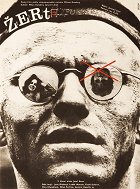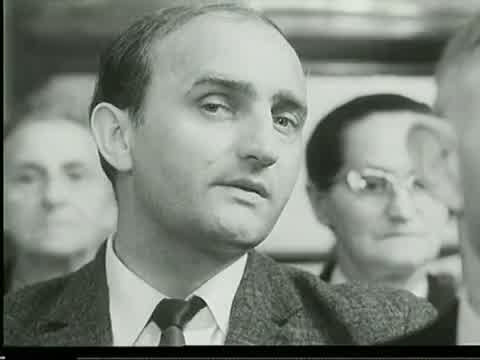Regie:
Jaromil JirešKamera:
Jan ČuříkMusik:
Zdeněk PololáníkBesetzung:
Josef Somr, Jana Dítětová, Luděk Munzar, Jaroslava Obermaierová, Milan Švrčina, Miloš Rejchrt, Evald Schorm, Věra Křesadlová, Jaromír Hanzlík (mehr)Inhalte(1)
Ludvík Jahn returns to his native city after many years to meet the radio reporter Helena Zemánková, who plans to broadcast a story on a local traditional folk festival, Ludvík wants to have his revenge. Helena has no idea that Ludvík's interest in the meeting is not caused by her withering appeal but her husband's photograph which Ludvík spotted in her cigarette case. Fifteen years ago, Pavel Zemánek was Ludvík's faculty colleague, chairman of the faculty organization of the Communist Party of Czechoslovakia and also his best friend. At that time, Ludvík's colleague and love Markéta sent him from her training a letter full of swollen optimism and phrases. He sent her a reply on a postcard and closed his ironical message with the greeting "Long Live Trotsky!" His practical jokes, however, were not appreciated and, thanks to Pavel, Ludvík was expelled both from the party and the school and sent to military service with the so-called "Black Barons," Auxiliary Technical Battalions, then to military prison and finally for three year's work in the mines. Ludvík wants to have his revenge on the hated Pavel by seducing his wife. In a lent flat, Ludvík not too affectionately takes Helena into his power. When he learns that the Zemáneks marriage has been solely formal for many years already, he rejects the woman's infatuated chattering with contempt. Helena tries to commit suicide - which is as ridiculous and misshapen as Ludvík's desired revenge... (Verleiher-Text)
(mehr)Kritiken (6)
Like the book on which it is based, the film version of The Joke is worthy of the Kundera name. The author collaborated on the screenplay, which was written before the book was published (though not before the book itself was written), thanks to which Jireš’s film works as a coherent bitter comedy independent of the book. The film is not harmed by the most significant change compared to the book, namely the distillation of the book’s multiple narrators into one – instead of specific language, the others are presented to us through the appropriate speech of the actors (Kostka’s brief chapters full of religious motifs are fully compensated for by the several-minute appearance of Evald Schorm, the moral authority of the New Wave). The determination in Josef Somr's otherwise sadly vacant gaze multiplies the tragicomic nature of Ludvík’s actions. Whatever he does, he ends up hurting himself or someone else. Would it be better if he did nothing? The flashbacks, in which we see others through Ludvík’s eyes and the characters speak directly to us (resulting in an actual dialogue with a past era), serve as ironic commentary on the present: the initiation of young children as new citizens x the treacherous beasts that they will most likely grow up to be; traditional folk music x hard work in the mines. Irrational laughter is offered as the only reasonable solution. Like Kundera the author, Kundera the screenwriter warns against forgetting the past without sliding into moralistic preaching. Besides Ludvík, who is frozen in the past like the eggnog at the end of Passer’s Intimate Lighting, most of the characters behave as though there was no “then”. The impossibility of determining what is better gives rise to an intense, long-lasting feeling of futility. 80%
()
Eine eher misslungene Adaption, deren Qualität nicht dadurch beeinträchtigt wird, dass Milan Kundera das Drehbuch geschrieben hat. Der erste Teil ist auf jeden Fall eine ausgezeichnete Idee, da das gesamte Disziplinarverfahren von Ludvík aus der Ich-Perspektive erzählt wird und sich auf den gealterten Ludvík bezieht, der auf Rache aus ist. Ein eher grundsätzliches Problem ist, dass die Komplexität des Buches nicht auf den Film übertragen werden konnte, und so reduziert sich die ganze Geschichte auf eine zynische Rachegeschichte eines gedemütigten, kaltblütigen Nihilisten. Logischerweise verschwand so nicht nur Ludvíks unglücklicher Versuch, sich selbst hinter dem ewigen Kreislauf der Masken zu finden, sondern auch viele wunderbare Momente des Buches (allen voran die Episode mit Lucia). Selbst die Verurteilung der Ideologie ist im Vergleich zu der Position, die Kundera in seinem Buch einnimmt, viel direkter und einfacher. Die Erkenntnis der gemeinsamen Schuld am Zustand der Welt und gleichzeitig der Ohnmacht gegenüber der Geschichte ist eine der starken Qualitäten des Textes, die im Film jedoch fehlt (das Drastische an Ludwigs Witz ist, dass alles, wofür er von seinen Kameraden verurteilt wird, von einem bestimmten Standpunkt aus betrachtet tatsächlich wahr ist). Ich denke, das musste so sein.
()
Joke, that is primarily an exceptional literary substance, one of Milan Kundera's best works and at the same time one of the best novels about the atmosphere of the 50s in our country. A bitter narrative about how history can crush individuals, and about the fact that revenge does not have to taste sweet and carry bitterness within oneself means unnecessarily depriving oneself of a lot of pleasant things. It is a burden that marks everyone. One of Josef Somr's crucial roles tailored to his acting. Overall impression: 90%.
()
From the works of the problematic years of Czechoslovak cinema (sometimes considered the works of the Czechoslovak miracle), I rarely got the feeling that my time was not wasted and that it wasn’t a torturous experience. Some of the results of Jaromil Jireš prove this. I find myself cautiously appreciating The Joke. That wouldn't be the case if I hadn't enjoyed Tomorrow, People Will Be Dancing Everywhere so fully, given the fact that without seeing those exalted national dances in action, this would feel like nothing. The caricatures of Munzar and Křesadlová bring The Joke down to earth, Schrom is defenseless in his acting as a child, and Dítětová makes me shudder, but I can single out Somr above all hesitations.
()
Der Scherz weist natürlich eine hohe Qualität auf, wenn Milan Kundera beim Drehbuch aufgepasst hat. Ganz sicher ist dies keine solche Explosion wie die Unerträgliche Leichtigkeit des Seins. Ich gewinne immer mehr den Eindruck, dass Kunderas Bücher nur sehr schwer zu verfilmen sind. Der Stil, in dem Der Scherz gedreht wurde, mit ständigen Schnitten, ist nichts für mich, vielmehr störte mich das. Es störte mich, dass die Handlung stark gekürzt war, trotzdem sind die schauspielerischen Leistungen mehr als anständig.
()
I've never read anything by Kundera, but from what I've read of him, the hero here, in his insufferability, arrogance, and bitterness, is pretty true to how I've always imagined him. Personally, what struck me most was the motif of the aging constructivist youth who even when witnessing a critical revision of socialist values in the 60s has tied their memories of youth to the monstrous celebrations, marches, and optimistic songs about reconstruction and the new era. As for Ludvík himself, he should have remembered the nationalist saying "If you want to dance with Švorcová, don’t be surprised when the gulag comes."
()

